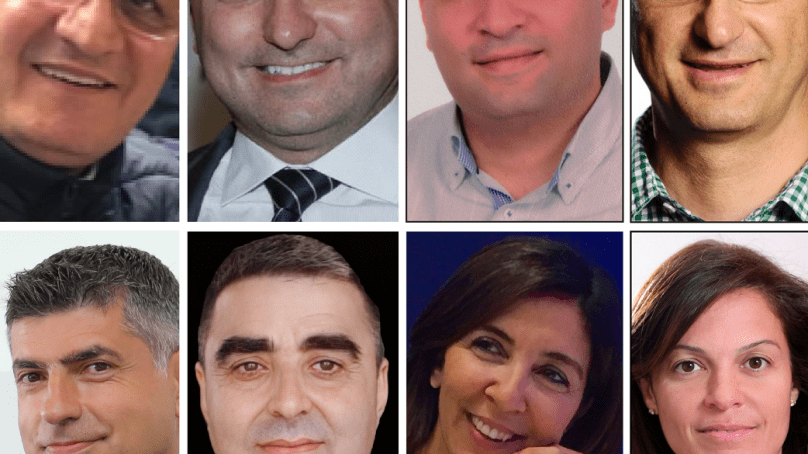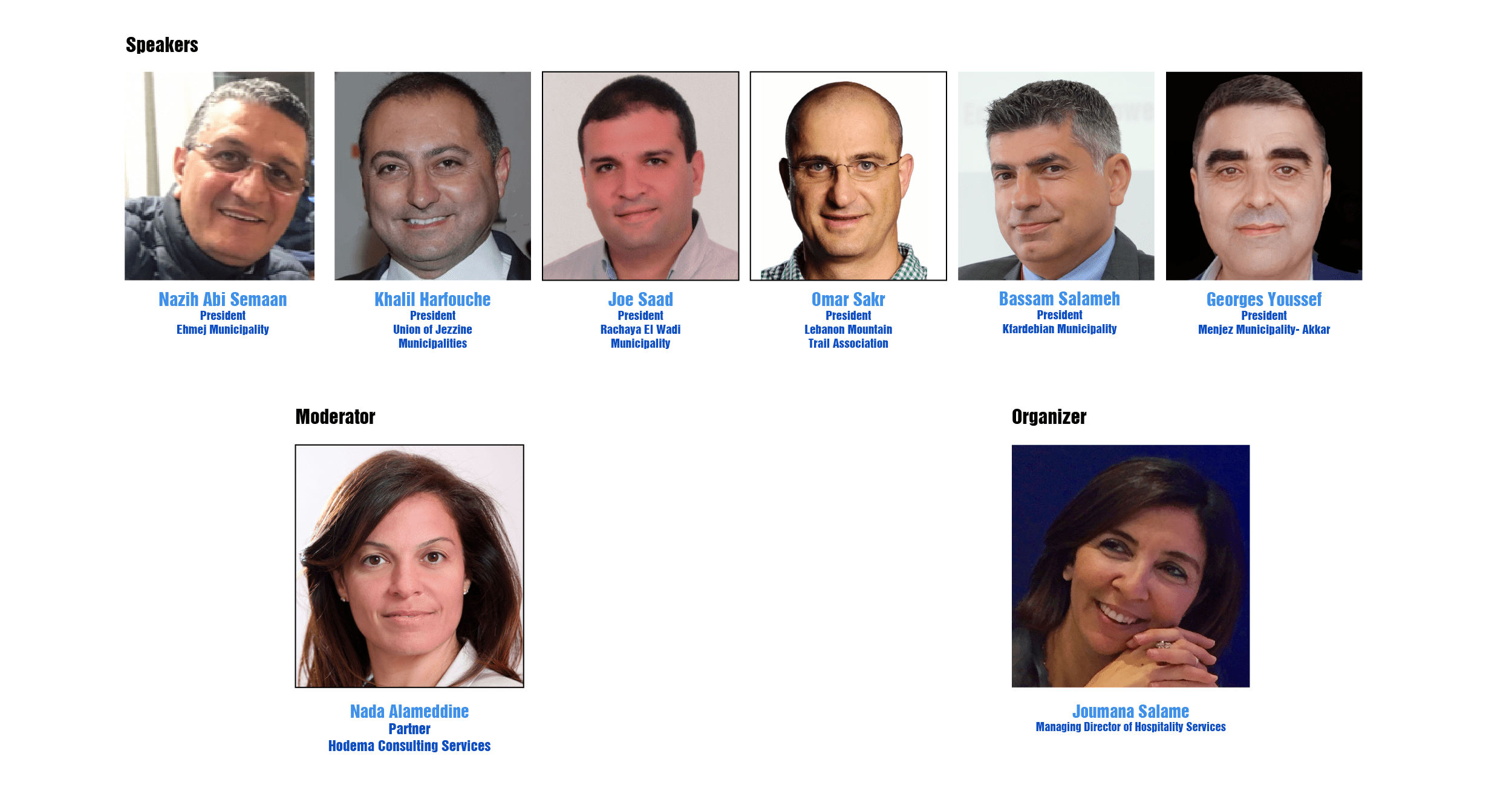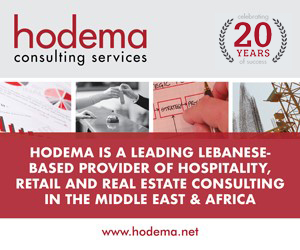Powered by Hospitality News Middle East and funded by the USAID Lebanon Enterprise development (LED) project, Hospitality News Talks held its sixth virtual roundtable on March 18— “What Lebanon’s municipalities are doing to boost tourism.” During the online session, one of 12 such talks, heads of municipalities and rural tourism specialists discussed what projects are being undertaken to encourage visitors to their regions.
The panel included: Nazih Abi Semaan, president of Ehmej Municipality; Khalil Harfouche, president of the Union of Jezzine Municipalities; Joe Saad, president of Rachaya El Wadi Municipality; Omar Sakr, president of the Lebanon Mountain Trail Association; Bassam Salameh, president of Kfardebian Municipality; and Georges Youssef, president of Menjez Municipality. Nada Alameddine, partner of Hodema Consulting Services, moderated the session.
Harfouche stated that several campaigns were launched to present Jezzine in the right way. “In 2012, we launched our vision for tourism. The following year, we worked on the ‘Jezzine 24h/24’ campaign, which stressed on the fact that Jezzine never sleeps and has a lot of exciting activities for visitors. We made it a point to communicate its proximity to the capital, and the campaign was a success.” Harfouche went on to say that Jezzine’s promotional budget has varied from year to year, but on average the budget has been around 10 percent.
In terms of achievements, Harfouche said that the municipality had a clear idea of the kind of tourist it wanted to target and created spots accordingly. “We established La Maison de la Forêt, a communal eco-touristic site within Bkassine’s pine forest. It offers a great escape for people looking to enjoy outdoor adventure, through quality food and rustic accommodations. It is a unique project because it is a joint effort with the private sector. We have succeeded in attracting hikers, bikers, etc.”
Abi Semaan said that in 2009, Ehmej Municipality established a roadmap to launch rural tourism. Thanks to the help of USAID, several other campaigns have been launched since. “We have the lowest promotional budget among all the towns on the panel, but we have numerous festivals, including the Mouneh Festival.”
Abi Semaan stated that the town relies on social media for promotion and gets funding thanks to associations and NGOs like Mouawad, USAID, AUD, etc.
Salameh talked about how Kfardebian Municipality focused on marketing and promoting Faqra. “We encouraged domestic tourism through social media, and we collaborated with the local media to highlight the top places,” he said.
He added that the annual budget dedicated to marketing is around five percent but no promotional campaigns were planned for 2021 due to Covid-19.
Salameh pointed out that the current law prohibits municipalities from hiring a third party to run promotional campaigns. “We created our own marketing campaign for Kfardebian to highlight the difference between Faqra and Faraya; many people usually confuse the two. Faqra International Festival was established, AHLAM Golf & Mountain Village was launched, and we collaborated with TV stations to promote Kfardebian as a ski and sports destination. Our campaigns largely centered on our mountain trails because it was the only thing visitors could really do during the pandemic.” Indeed, the municipality’s website receives a lot of traffic.
Youssef emphasized that Menjez’s heritage is being threated and the municipality has collaborated with several associations and the press to help safeguard its beauty spots. “We established a roadmap for rural tourism and came up with a 25-step plan for the short term and long term.”
Being the smallest and newest municipality, Youssef said that everything that is achieved in Menjez in terms of tourism is thanks to the commitment of NGOs and locals. “We conducted four studies to get enough capital to fund small and medium-sized companies, tourism providers, etc. Menjez has been classified as a bio-diverse town, and our aim is to be named the most beautiful village in Lebanon.”
Youssef pointed out the village’s hidden gems. “Deir Al Adhra (Monastery of the Virgin) in located in Menjez. Between 2017 and 2019, we collaborated with USJ and Directorate of Antiquities with Geneva to launch Beit Al Turath. It is a heritage house that was created as a space for creativity and craftsmanship. The project generates an income for local ceramicists and craftspeople.”
Saad spoke about the progress Rachaya El Wadi’s municipality has made in terms of tourism development. “Rachaya is a huge town that’s known for its pottery and the church bells that are made there. We developed a roadmap, and we were able to convert Jabal El Sheikh — the highest peak of the Anti-Lebanon Mountains — into a nature reserve.”
Saad mentioned that the municipality works hard to highlight its history, local products, dairy, artisanal work, mouneh, etc. “When visitors come to Rachaya, they often visit the molasses and honey factories. We organized Pomegranate Day to celebrate our local production. Over 5,000 people were present. Furthermore, we invited schools to visit the Rachaya Citadel on Independence Day to learn about our nation’s independence and the events that led to it,” he added.
In terms of marketing, Saad confirmed that part of the funding comes from the municipality and some is collected independently. “Being a huge village, we are able to collect a lot of funds. We do not have a marketing budget other than for social media. Rachaya’s funds are directed towards rural and agricultural development, which can indirectly help promote tourism. Although we distribute brochures and such, word of mouth is a valuable tool in promoting the area.”
Sakr said that the LMTA launched a campaign called “Hike Responsibly” to raise awareness about respecting Covid-19 protective measures while hiking. He also said that thanks to Darb el Salib hiking trail, it has been possible to unite several villages. “Our aim is to preserve our cultural and artistic heritage. We rely on developmental projects and partnerships with other towns.”
Sakr spoke about fundraising and mentioned that the LMTA works on annual activities to cover its costs. “Hikers love our trails so much so that they financially support us whenever they can; they also promote us whenever possible. This year, we worked on a virtual hike to help raise money.”
While the LMTA uses to social media to promote the trails and the importance of responsible hiking, Sakr stated that word of mouth is the main tool. “People talk about how much they like our trails. We also rely on videos to promote the trails; the videos get a lot of views.”
The panelists commented on the importance of coming together, supporting one another and aligning in order to promote domestic tourism across the country. They agreed that local tourism would continue to grow due to ongoing Covid-19 travel restrictions and currency devaluation making overseas travel a challenge for families.
With hiking becoming a more popular activity, it was suggested that a greater number of hiking trails are introduced, especially in the lesser-known regions.
The webinar can be viewed in full here.
The next Hospitality News Talks, “From Lebanon to the world: connecting local brands to international buyers” will take place on March 25. Click here to register.
To access the full program of Hospitality News Talks webinars, click here.















